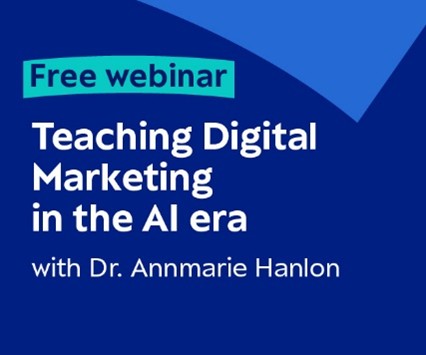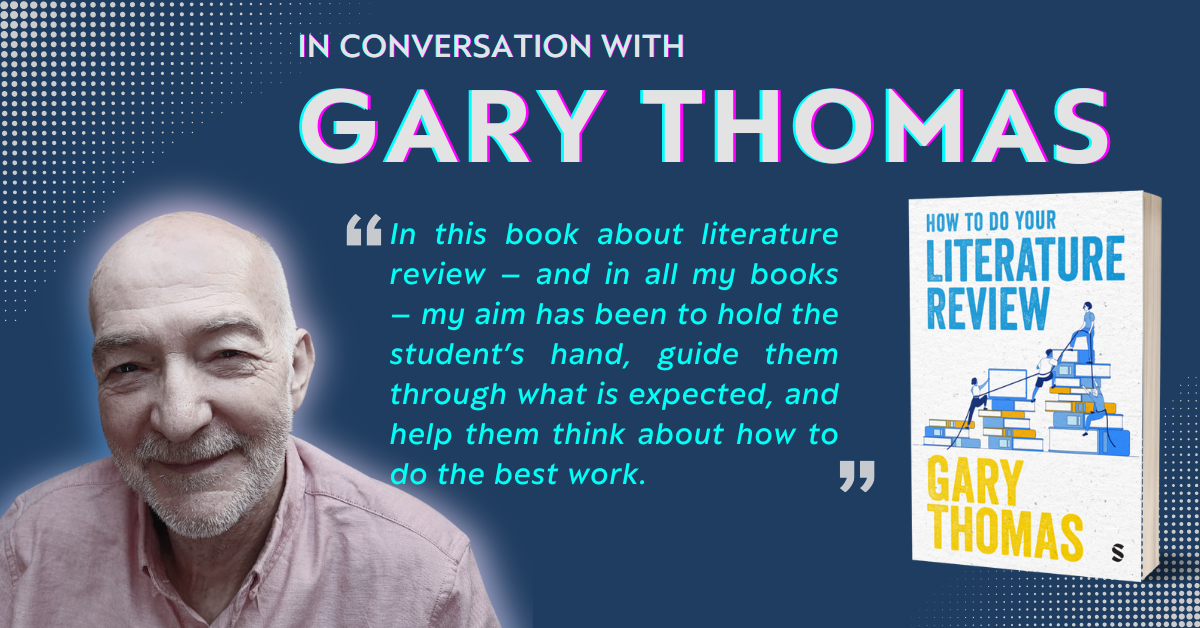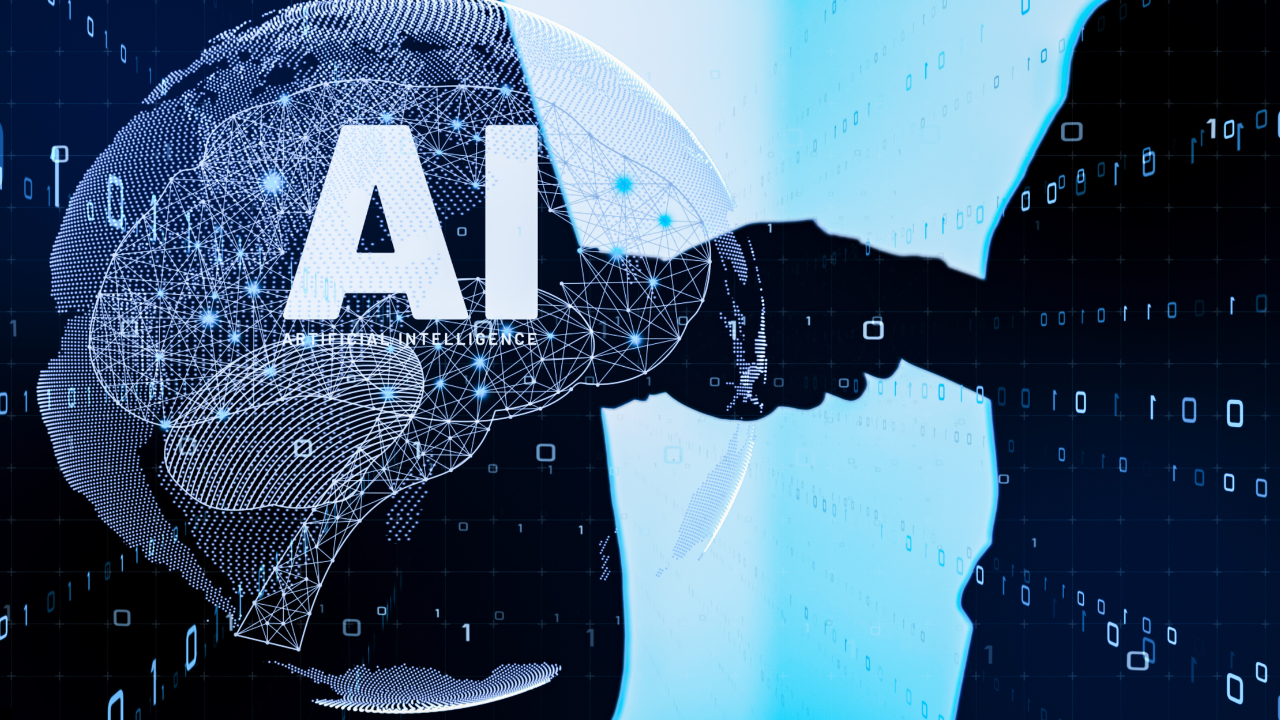With ChatGPT's meteoric rise in just five days, artificial intelligence has seamlessly woven itself into the fabric of daily life—its influence impossible to overlook in the realms of education, marketing, and beyond. Recognizing its growing impact, we hosted a webinar with Dr. Annmarie Hanlon, author of the newly released Third Edition of Digital Marketing. In this Q&A session, Dr. Hanlon tackled your most pressing questions about navigating digital marketing in the age of AI. Here, we delve into her insights, exploring the possibilities, challenges, and future of AI-driven marketing strategies, as well as the evolving opportunities and complexities of teaching this subject.
What are some professional digital marketing strategies that are good for business and the planet?
Responsible digital marketing strategies that consider business and the planet can be co-created using the United Nations SDGs as a framework. There are debates about the resources used to power AI and how this can negatively impact the planet. However, in some cases AI tools can support smaller businesses as digital assistants, contributing to decent work and economic growth (UN SDG 8).
What are your thoughts on the sustainable impact of AI?
The AI and sustainability debate is polarised and there is no simple solution at the moment. In some situations, AI’s predictive capabilities support the environment and reduce resources. For example, AI tools can learn weather patterns and contribute to climate forecasting. This enables farmers to better manage crops, potentially using less energy and valuable resources such as water, helping farming to become more sustainable.
Yet, conversely, AI, like most technology, requires huge data resources. A study cited on MIT’s Technology Review (see 'Making an image with generative AI uses as much energy as charging your phone') has found that ‘generating an image using a powerful AI model takes as much energy as fully charging your smartphone’. The author of the study, Sasha Luccioni and colleagues, have asked why AI chatbots don’t have energy ratings – like lightbulbs.
How can we adapt or incorporate AI tools in teaching/assignments to ensure that students still develop key skills such as critical thinking?
Students are discovering that AI does not provide the depth and detail they need and can be incorrect. This is, according to some research, enhancing their critical thinking skills as they assess different AI tools and review the outputs.
To start, encourage students to refine the prompts and then evaluate how these have changed and the impact on the results. This can be further extended with a reflection piece which may be 200, 300 or 500 words, at the end of the assignment about the application of AI. This piece can assess where AI enhanced the work and where it was less useful and changes that were required. This ensures that students are actively questioning the AI tools that they are using rather than just taking for granted that it is all true and accurate.
I would also request a standard declaration at the start of a piece of coursework, assignment or essay that says, ‘This assignment has used AI, the following AI tools have been used to perform the following tasks’. This ensures that students are encouraged to be transparent about their use of AI.
Do you see any differences in terms of curriculum design for undergraduate and postgraduate marketing classes involving AI?
I think within undergraduate classes, it's about introducing the use of AI so you don't get that cognitive offload where they're just thinking, “I'll just get AI to do my essay for me. I won't bother”. It’s vital to introduce them to the notion of plagiarism and ethics. Ethics in our everyday life will become more important. We need to explain that if they are planning to complete their degree using AI, they may get into plagiarism, and at that point, they may be asked to leave the university without a reference, which impacts their future life. In the same way many students are becoming slightly more careful about some of the things they share on social media, they need to understand the consequences of potentially relying on AI as a tool in those early years.
At the post-grad level, it may be about using AI as an assistant, supported by a full declaration. Potentially using it to refine those prompts, and for better evaluation.
In summary, there are two levels. At that younger level, it's about understanding the ethical issues and the impact it could have on their future careers, their future roles, and what they really want to do. At the post-grad level it's about using AI critically and intelligently.
What’s your take on declarations for dissertations?
It's a real challenge with dissertations because it’s unclear how much the AI did and how much the individual did. Another factor is that if the dissertation is being used for a paper afterwards and if it's found out that most of this was created using AI, both the academic and the student submitting the work risk reputational damage.
One solution is a more coherent briefing about the use of AI when dissertations are being introduced, before they start class. Explaining that AI can be used, but there are risks attached, and you need to be cautious of an over dependence.
Yet some AI tools such as Grammarly, aren’t even considered as an AI tool. Grammarly offers improvements to the text (gentle re-writes). There are many people that would use this to refine their academic writing before submitting a paper.
This means that there is a continuum of AI and where, how, why it is being applied. Grammarly offers a text sense-check, which feels acceptable; but students need greater guidance when it comes to conducting literature reviews. Just using AI may result in a failed dissertation.
Would you recommend using AI for the evaluation of student reports, coursework, and theses, and if not, why not? What are the possible impacts of using this as a tool?
It's a really hot topic. I have academic colleagues who are exploring using AI to do marking and it again depends on the university's protocols, whether that's permitted or not permitted, and whether students might complain en masse that AI marked my essay and therefore, I didn't get the grade that I should have got. It very much depends on your AI policy within your university.
It can be a very efficient way of marking. For example, marking first-year papers if they don't count towards the final degree may be more acceptable than using AI to mark a final-year thesis. However, marking via AI still requires human input to train the AI tools and clarify what the different grades are based on.
I use Mendeley as my referencing software and it has introduced limited AI which provides a super quick summary. I can ask Mendeley lots of questions, summarize the article, provide the top theory used and identify the outcomes. It can save some reading time but typically we, as academics, read very quickly and we read a lot of material. Ultimately, it goes back to what's the policy within your organisation.
Are our jobs as Lecturers at risk with the advancement in technology?
All new technology creates new jobs. Technology is often seen as a solution, yet it requires greater input to assess how and where it functions. AI is being used at a basic level in some countries to support teachers, but this is because there are a lack of teachers and skills gaps. There is still a teacher present to guide the AI.
I don't see AI replacing teachers in the classroom. If we can use AI to do the basic tasks, then we can do more interesting work. For example, using Microsoft copilot (or Google’s equivalent tools) to highlight multiple student emails that have come through as the same question, and then fabricating a response to that. This saves time and enables lecturers to potentially do less admin!
Do you think AI will significantly replace some of the most creative aspects of digital marketing?
AI can help and support with idea generation and basic tasks. Creating skillful and meaningful content that connects to the audience is still further away.
For example, people were worried that we wouldn’t need copywriters anymore. But AI copy tends to be bland and generic. At some point Google is likely to penalize AI created content because it will be able to recognize what's been created by AI and what's been created by an individual. When an individual creates content, it creates the content with some heart and soul. AI doesn’t do that yet.
I was at an author's presentation before Christmas. A very well-known author, Joanne Harris, who writes fiction, was there. She wrote the best-selling book Chocolat, which became an award-winning film. She said that the top 100 self-published books on Amazon were written by AI. However, they may be the top 100 because they'd all been reviewed by AI. Where lots of reviewers have reviewed one book, or lots of AI books and simply comment that ‘this is a great book. I enjoyed reading this book. This book was great fun. I kept turning every page on the book.’ These reviews lack depth and detail, which can soon be recognised.
Similarly, while imagery is being created via AI it can introduce bias with idealised versions of individuals, and it rarely adopts diversity unless specifically requested. Many images look as if they are from the set of a science fiction movie.
AI has a place and it is improving, but it won't replace that person who has been trained for years in the art of copywriting or has been trained in image generation. They may supervise the process and, for example, use it for brainstorming ideas and developing further. But again, it's like a 14- or 15-year-old creating material for you that you need to edit afterwards.
Watch the full webinar with Dr Annmarie Hanlon: Teaching Digital Marketing in the AI era.

Get your inspection copy of Dr. Annmarie Hanlon’s Digital Marketing, Third Edition.
Book Details:
Digital Marketing: Strategy, Planning & Disruption
Edited by: Annmarie Hanlon
ISBN: 9781529680430
£51.99








